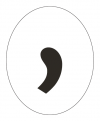Fun Tips to Conquer Common KS1 Grammar Mistakes
 Good grammar can make the difference between “it’s time to eat, grandad” and “it’s time to eat grandad”!
Good grammar can make the difference between “it’s time to eat, grandad” and “it’s time to eat grandad”!
However, helping your class to become grammar gurus won’t just prevent comical literacy errors. 
Grammar is vital to both written and verbal messages, allowing us to be clearly understood. As a result, communication is far more rewarding, with children able to clearly express their fantastic ideas and imaginations.
Whether writing a postcard to their auntie, an invite to a birthday party or a letter to Father Christmas, confident grammar will open the door to meaningful interaction and opportunities – but it’s a lot to learn (and can feel like even more to teach, especially when ability is wildly mixed).
So, to help your pupils become first-class communicators, take a look at our tips to help overcome some of the most common grammar mistakes encountered in KS1.
1. Big problems with little characters – can your class use capital letters appropriately?
Whether they’re completely overused or entirely absent, including capital letters can either be a case of ‘I forgot’ or ‘I really don’t know’.
To help children think about the context of what they’re writing, as opposed to just how it looks on the page, try using visual cues.
Hold up a picture and let the children advise of the spelling – and if it needs a capital letter. Mum, dog, London, apple – a nice mix.
Your class will be identifying proper nouns before you can say ‘Visit Pete’s Pizzeria in Paris’!
2. Avoid an apostrophe catastrophe.
When teaching shortened forms of words, as well as marking possession, apostrophes for contraction are generally the easier concept for children to grasp.
If your class are struggling to indicate possession in the right way, a classic game of bingo can really help the penny to drop.
Pass all the children a bingo board, with sentences showing apostrophes used for possession – such as ‘Jack’s book’ and ‘the scooter’s wheels’.
Equip yourself with a separate set of sentences, without apostrophes, but matching – such as ‘the book belongs to Jack’ and ‘the wheels of the scooter’. When you read these sentences aloud, the children are tasked with crossing off the sentence with the corresponding apostrophe use.
When they cross off a line – “BINGO!”.
3. Comma confusion is going, going, gone!
Help your class brush up on their list-making skills, just in time for Christmas; after all, who knows the current criteria to avoid a lump of coal?
A game of ‘Guess Who’ is a fun way to introduce writing lists, while also letting the class get to know each other a little better.
Ask the children to write a sentence describing a friend; for example, “This person has brown hair, a pet dog, nice handwriting and a sister”.
Go around the room and ask each child to read their sentence aloud, indicating where the comma sits (they could just say ‘comma’, or perhaps do something more fun, like a hand gesture).
Can the class guess who they’re describing? Can they confirm that the commas have been used correctly?
4. Fully ingrain the use of full stops.
Do your pupils put a full stop on the end of every line – even though the sentence hasn’t ended? Or do they simply not use them at all?
Try playing ‘traffic lights’, using a green and a red pen or pencil.
The start of each sentence is ‘GO!’, so mark that first capital letter in green. The end of the sentence is ‘STOP!’, so note that full stop in red.
Before you know it, your class will understand that sentences are commanded by the writer, not the paper!
Did you know that your existing teaching strategies could be complemented in an exciting new way?
Mighty Writer is a one-of-a-kind literacy tool, which allows children to learn how to write coherent sentences with the help of compelling images, scaffolding and – of course – their own imagination.

